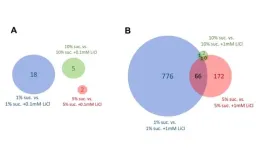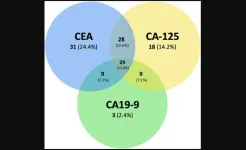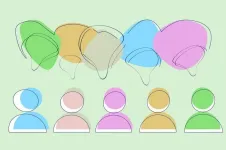(Press-News.org) ARLINGTON, Va., June 20, 2024 — The American Society for Radiation Oncology (ASTRO) announced today that following a nationwide search, Vivek S. Kavadi, MD, MBA, FASTRO will become CEO of the Society effective November 1, 2024. Dr. Kavadi will succeed Laura Thevenot, who previously announced her intent to retire after leading the organization since 2002.
Dr. Kavadi, a radiation oncologist and ASTRO member since 1994, ascends to the role from his current position as Chief Radiation Oncology Officer for The US Oncology Network, where he oversees strategy, operations and clinical service delivery for a network of 200 physicians. From 2003 to 2020, Dr. Kavadi served as Regional Medical Director for Texas Oncology, where he managed a 60-physician practice in the Houston region. Since 1995, Dr. Kavadi also has maintained a clinical practice as a radiation oncologist for Texas Oncology, where he specializes in breast and prostate cancers.
Dr. Kavadi’s history with ASTRO includes his current role on the Board of Directors as vice chair of the Health Policy Council and his previous tenures on the Health Policy and Payer Relations Committees. In 2019, he was recognized by ASTRO as a Fellow for his service to the Society and his contributions to the field of radiation oncology.
“We are so pleased to have Vivek lead ASTRO at this key time for the specialty,” said Jeff M. Michalski, MD, MBA, FASTRO, chair of the ASTRO Board of Directors. “The appointment of a physician from our specialty with first-hand experience of the challenges that practicing physicians face each day marks an important milestone for ASTRO. Vivek’s deep understanding of the field, as well as his operational and business acumen, makes him an ideal fit for our Society. His expertise will be valuable as we navigate the legislative landscape with the recent introduction of the Radiation Oncology Case Rate (ROCR) Value-Based Payment Program Act as well as a myriad of issues important to our 10,000 members, including physician education, guideline development, scientific advances and industry partnerships.”
"I am deeply honored to step into the CEO role at ASTRO to help advance our wonderful specialty,” said Dr. Kavadi. “I do not take the challenge of leaving my current role in community cancer care to lead a national organization lightly. I recognize that I will step into the role succeeding Laura Thevenot, who has led the organization with skill and distinction for the past 22 years. I know I will be at the helm of a healthy, thriving organization, and I am committed to fostering further collaboration, scientific advancement and excellence within our specialty. I am also pleased to be able to work alongside the dedicated ASTRO staff with whom I’ve had the pleasure of working with during my time as a committee volunteer and Board member. I look forward to their continued engagement to ensure we best serve our members."
Dr. Kavadi obtained his MBA from The Wharton School, his medical degree from Harvard Medical School and his bachelor’s degree in biochemistry from Rice University. He completed his radiation oncology training at the University of Texas MD Anderson Cancer Center, where he was chief resident and served on the faculty.
ABOUT ASTRO
The American Society for Radiation Oncology (ASTRO) is the largest radiation oncology society in the world, with more than 10,000 members who are physicians, nurses, biologists, physicists, radiation therapists, dosimetrists and other health care professionals who specialize in treating patients with radiation therapies. Radiation therapy contributes to 40% of global cancer cures, and more than a million Americans receive radiation treatments for cancer each year. For information on radiation therapy, visit RTAnswers.org. To learn more about ASTRO, visit our website and media center and follow us on social media.
END
Dr. Vivek S. Kavadi named CEO of the American Society for Radiation Oncology (ASTRO)
2024-06-20
ELSE PRESS RELEASES FROM THIS DATE:
Dietary sucrose determines activity of lithium on gene expression and lifespan in drosophila melanogaster
2024-06-20
“[...] we found that, in female D. melanogaster, the life-prolonging effect of dietary lithium is dependent on the actual sucrose content of the medium.”
BUFFALO, NY- June 19, 2024 – A new research paper was published in Aging (listed by MEDLINE/PubMed as "Aging (Albany NY)" and "Aging-US" by Web of Science) Volume 16, Issue 11, entitled, “Dietary sucrose determines the regulatory activity of lithium on gene expression and lifespan in Drosophila melanogaster.”
The amount of dietary sugars and the administration of lithium both impact the lifespan of the fruit fly Drosophila melanogaster. It is noteworthy that lithium ...
Assessment of CEA, CA-125, and CA19-9 as adjuncts in non-small cell lung cancer management
2024-06-20
“[...] these inexpensive, widely available tests with rapid turnaround times and relatively short half-lives (CEA, CA-125, and CA19-9) are perfectly situated to serve as adjunctive clinical tools in the management of NSCLC.”
BUFFALO, NY- June 20, 2024 – A new research paper was published in Oncotarget's Volume 15 on June 13, 2024, entitled, “Assessment of serum tumor markers CEA, CA-125, and CA19-9 as adjuncts in non-small cell lung cancer management.”
Conventional tumor markers may serve as adjuncts in non-small cell lung cancer ...
Iron meteorites hint that our infant solar system was more doughnut than dartboard
2024-06-20
Key takeaways
Iron meteorites are remnants of the metallic cores of the earliest asteroids in our solar system. Iron meteorites contain refractory metals, such as iridium and platinum, that formed near the sun but were transported to the outer solar system.
New research shows that for this to have happened, the protoplanetary disk of our solar system had to have been doughnut-shaped because the refractory metals could not have crossed the large gaps in a target-shaped disk of concentric rings.
The paper suggests that the refractory metals moved outward ...
Anti-trust regulators should consider their options carefully when start-ups are acquired, new study suggests
2024-06-20
June 20, 2024
Anti-Trust Regulators Should Consider Their Options Carefully When Start-Ups are Acquired, New Study Suggests
Less Blunt Options than Banning Acquisitions May Help Preserve Innovation and Competition
Toronto - Promoting a competitive marketplace has been the main focus for regulators concerned with “killer acquisitions” -- when big companies swallow small startups to eliminate a potential rival.
But researchers and other observers point out that blocking these purchases puts something else important at risk – innovation. Startups are sometimes driven to come up with a new process or product precisely because ...
Family conditions may have more of an impact on upward social mobility than gender inequality
2024-06-20
Family conditions—specifically, how similar one’s social status and background is to one’s parents’ status—may play a bigger role in determining how easily an individual can shift into a wealthier socioeconomic class than gender inequality, according to a study of 153 countries published June 20, 2024 in the open-access journal PLOS ONE by Khanh Duong from Maynooth University, Ireland.
As global inequality increases, researchers have found that countries with higher levels of income inequality tend to experience lower rates of class mobility (in other words, individuals in a lower socioeconomic ...
People with higher weight, and those who have high-quality experiences with higher-weight people, report less weight bias, per social psychology study of US adults
2024-06-20
People with higher weight, and those who have high-quality experiences with higher-weight people, report less weight bias, per social psychology study of US adults
###
Article URL: https://journals.plos.org/plosone/article?id=10.1371/journal.pone.0305080
Article Title: The role of social norms, intergroup contact, and ingroup favoritism in weight stigma
Author Countries: USA
Funding: The authors received no specific funding for this work. END ...
In two separate clinical studies, combined immunotherapy approach enhances cancer patient response
2024-06-20
Because not all cancer patients respond to a leading type of cancer immunotherapy drug, known as an immune checkpoint inhibitor, scientists explored whether adding janus kinase (JAK) inhibitors – drugs that treat chronic inflammation – could help. In two separate clinical studies, researchers found that adding JAK inhibitors did improve patients’ responses to cancer checkpoint inhibitor immunotherapies. “Aside from the exciting findings of the early phase trials reported by [both groups], they provide a great deal of data with complex analyses of immune ...
Airborne mapping reveals roles for biogenic sources and temperature in air pollution emissions in Los Angeles
2024-06-20
Airborne observations over California have revealed that biogenic sources of volatile organic compounds (VOCs) – blooming trees and growing plants – dominate summertime air pollutant formation in Los Angeles, in a way that increases with temperature. Future air pollution regulations thus need to consider that only 40% of urban VOC emissions (those not tied to biogenic sources) can be mitigated through regulations, say the authors. Ambient air pollution – the fourth-leading global ...
Old bombs reveal new insights: Plants store more carbon, but for a shorter time frame, than we thought
2024-06-20
Analysis of radiocarbon produced during nuclear bomb testing in the 1960s suggests that current Earth system models underestimate carbon uptake into terrestrial vegetation and soils. But, say the study’s authors, this storage is more short-lived than previously thought. The findings suggest that anthropogenic carbon dioxide will not reside as long in the terrestrial biosphere as models currently predict. Accurate climate predictions, crucial for developing effective climate policies, require a robust representation of the global carbon cycle. It’s thought that vegetation and soils account for taking up approximately 30% of anthropogenic carbon dioxide (CO2) ...
The time it takes a person to decide can predict their preference
2024-06-20
Researchers led by Sophie Bavard at the University of Hamburg, Germany, found that people can infer hidden social preferences by observing how fast others make social decisions. Publishing June 20th in the open-access journal PLOS Biology, the study shows that when someone knows the options being considered by another person, and they know how long it takes them to reach their decisions, they can use this information to predict the other person’s preference, even if they do not know what the actual choices were.
How do we know what someone’s social preferences ...



